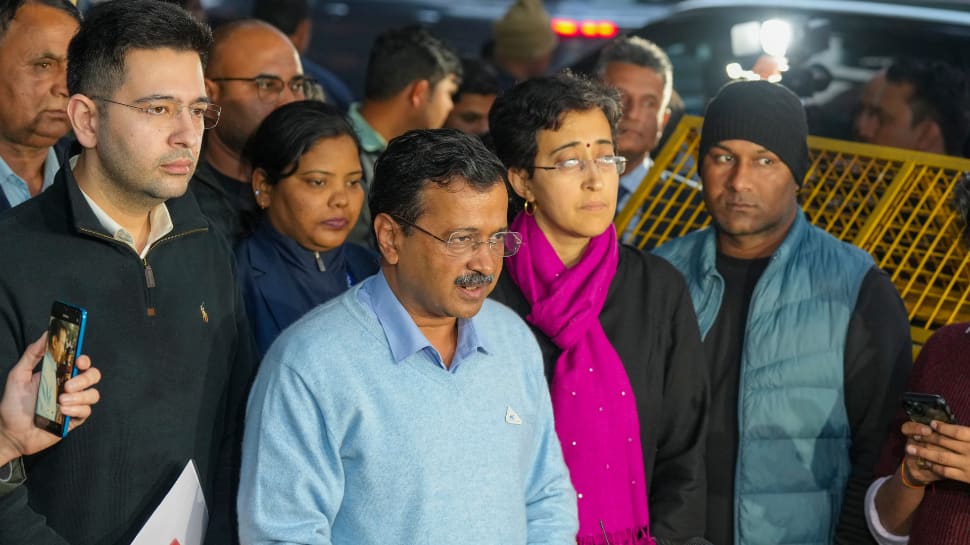 |
|
The eve of the Delhi assembly elections witnessed a heated exchange of accusations between the Aam Aadmi Party (AAP) and the Bharatiya Janata Party (BJP). AAP supremo Arvind Kejriwal, accompanied by Delhi Chief Minister Atishi, met with the Election Commission of India (ECI) to lodge serious allegations against the BJP, claiming that the party, along with the Delhi Police, was engaging in widespread hooliganism to create an atmosphere of fear among voters. Kejriwal specifically alleged that BJP workers might attempt to mark voters' fingers with black ink to prevent them from casting their ballots. He painted a picture of systematic voter suppression, targeting vulnerable populations, particularly those residing in slum areas. This claim underscored a serious concern about the integrity of the electoral process and the ability of citizens to exercise their fundamental right to vote freely and without coercion.
The BJP, however, swiftly countered these allegations, accusing the AAP of orchestrating a conspiracy to disenfranchise BJP supporters. Delhi BJP president Virendra Sachdeva held a press conference, alleging that the AAP had submitted lists of thousands of voters – predominantly from Purvanchali, Vaishya, and Brahmin communities – to election officials, claiming that these individuals were either deceased or did not reside at their registered addresses. Sachdeva demanded that the ECI disregard these lists, ensuring that all registered voters on the official rolls would be able to cast their votes. This counter-accusation shifted the focus to allegations of voter suppression from the AAP, intensifying the political battle and raising questions about the credibility of the claims from both sides. The stark contrast in narratives highlighted the deep political divisions and the lengths to which each party was willing to go to secure victory in the upcoming elections.
Adding further fuel to the fire, Chief Minister Atishi herself became embroiled in controversy. She accused the BJP and its candidate, Ramesh Bidhuri, of engaging in hooliganism in her constituency, Kalkaji, further alleging that the Election Commission and Delhi Police were biased in their responses to these incidents, effectively shielding BJP workers while targeting AAP members. This accusation directly questioned the impartiality of the institutions responsible for overseeing the free and fair conduct of the elections. Hours later, Atishi herself found herself on the receiving end of an FIR filed by the Delhi Police for allegedly violating the Model Code of Conduct (MCC) and obstructing a public servant. The police claimed that she and a large group of supporters blocked a major road, refusing to comply with police instructions to vacate the area. Atishi countered these allegations on X (formerly Twitter), expressing her belief that the case was politically motivated and intended to silence her criticism of the BJP's actions. This incident further fueled the narrative of a biased approach by the authorities, escalating the already tense political climate.
The exchange of accusations between the AAP and the BJP underscores the highly contested nature of the Delhi assembly elections. The allegations of voter intimidation, suppression, and biased enforcement of the Model Code of Conduct raise serious questions about the fairness and integrity of the electoral process. Both parties engaged in a vigorous public relations battle, each attempting to sway public opinion and garner support from the ECI. The involvement of the Delhi Police in these allegations further complicates the issue, raising concerns about the impartiality of law enforcement during an election period. The outcome of the elections will be closely watched, not only for its political implications but also as an indicator of the effectiveness of safeguards designed to ensure free and fair elections in India's vibrant democracy. The contrasting claims and swift actions demonstrate a high degree of political maneuvering and strategizing in the run-up to the crucial vote, leaving the public to decide who to believe and ultimately, who to vote for.
Source: On Poll Eve, Kejriwal Meets EC, Alleges Threat To Voters; BJP Hits Back
